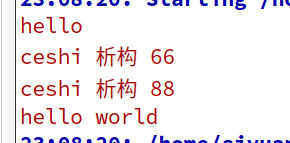1、std::exit() 由系统调用,表示结束进程。对于已构造的对象会调用析构函数(在一个析构函数中调用exit()会无限递归)。
std::exit(0); 向系统返回0,表示程序正常结束。
std::exit(0); 向系统返回1,表示程序非正常结束。
2、std::abort() 程序异常结束,不会调用析构函数:
#define debug qDebug()<<
struct ceshi
{
~ceshi()
{
debug "ceshi 析构";
}
};
int main(int argc, char *argv[])
{
ceshi c;
std::abort();
debug "hello";
}
3、std::atexit(void (*fun) (void)) 参数是一个函数指针,指向一个无参数无返回值的函数,终止前可以执行制定的函数。会调用析构函数,析构顺序:在std::atexit()前面定义的后析构,在std::atexit()后面定义的先析构:
#define debug qDebug()<<
struct ceshi
{
~ceshi()
{
debug "ceshi 析构" << a;
}
int a;
};
void debugValue()
{
debug "hello world";
}
int main(int argc, char *argv[])
{
ceshi c1;
c1.a = 88;
std::atexit(debugValue);
ceshi c2;
c2.a = 66;
debug "hello";
}
4、std::quick_exit() 和exit()相似但不调用析构函数。